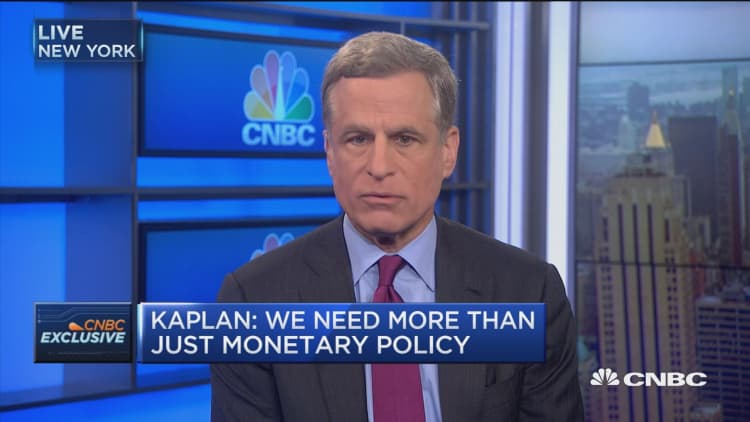
Dallas Federal Reserve President Robert Kaplan told CNBC on Wednesday that he and the Fed will be watching what comes out of the incoming administration's policies to see if they need to adjust their position on raising interest rates in the future.
"As we look ahead to 2017, as we continue to make progress on employment and inflation, I would expect we will remove some further amount of accommodation," Kaplan told CNBC's "Squawk Alley," referring to the expected rate hike in December, which Kaplan supports.
According to Reuters, Kaplan on Wednesday said he backed an interest rate hike "in the near future," adding to the very high odds that the U.S. central bank will tighten monetary policy next month.
Kaplan told reporters he had been "comfortable" with a rate hike at policy meetings in both September and early November. "My view has not changed. I believe we are at the point where we ought to be removing some amount of accommodation in the near future," he said.
Earlier on Wednesday, he said: "I would advocate that we take further action" to raise rates next year.
Kaplan said that even before the prospect of sweeping economic changes brought on by President-elect Donald Trump, the Fed was expecting 2 percent-plus economic growth in 2017, which he said the United States is approaching.
"We'll see how the new policies evolve and develop, and we'll be analyzing them, but if they help accelerate that, then that will give the Fed more operating room and we'll have to adjust our stance and our path to future rates accordingly," the Fed official said.
As the Fed president in Texas, the largest exporting state in the country, Kaplan said that the strength of the U.S. dollar will be something for the Fed to watch and react to in the coming weeks.
Not only could a strong dollar create headwinds for exports, but stabilization in emerging markets like China could contribute to currency volatility and global tightening of financial conditions, which could slow the U.S. economy, Kaplan said.
Kaplan said that he expects aging demographics in the United States to contribute to a decline in the labor participation rate over the next decade, which Congress should take into account when considering new economic policies put forth by the incoming administration.
"Ultimately, in order to get much higher levels and sustainable levels of GDP growth, we need to address the size of the workforce and its productivity," Kaplan said. "If the workforce is declining … that creates a headwind, so vocational training, improving educational attainment and yes, the size of the workforce, are going to be key drivers of future GDP growth."
— Reuters contributed to this report.


